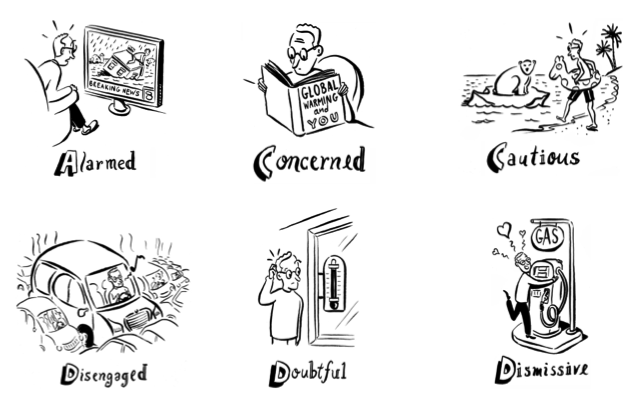In 2009, the Yale Program on Climate Change Communication published Global Warming's Six Americas which identified these 6 categories into which the American public falls based on their cultural, ideological, political, and other reasons for responding in a given way to the science of climate change. They continue to update this study regularly and have greatly expanded upon the depth and breadth of the questions asked (see the Yale Climate Opinion Maps 2021 for a fascinating look). We'll use this framework this week as we think about the importance of engaging our entire community in our climate change efforts, and not simply those whose ideas might align most closely with our own.

The danger in generalizations: It's important to note that some of the material we'll discuss in this lesson includes generalizations that may not translate to truth at the individual level. For example, while it's factually correct that more Republican lawmakers deny the existence of climate change than their Democratic counterparts, it is NOT true that all Republicans deny climate change and all Democrats support aggressive action. So please keep this in mind as we work through some of these generalizations - there are certainly nuances to all of this. (Check out RepublicEN and Climate Solutions Caucus, for examples.)
But, let's take a look at this graph depicting the League of Conservation Voters' scoring of members of the House and Senate on their environmental voting records from 1970 through 2016 (as recent as I could find comprehensive data for). The divide is growing, and climate change is a big part of that. What was once roughly a 20 point separation is now about 80. This graph is an important reminder that climate does not have to be a politically divisive issue, even if it is in our current politics. Remember, some of the earliest efforts to address climate change involved market-based approaches like cap-and-trade systems sponsored by Republicans like John McCain. And we can look further into the history of major environmental legislation to find that some of our hallmark laws passed under Republican-controlled administrations, such as the formation of the EPA and many seminal federal policies such as the Clean Water Act and Clean Air Act when Richard Nixon was president.

